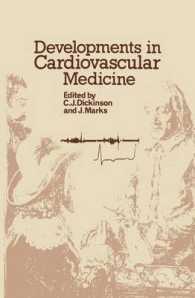- ホーム
- > 洋書
- > 英文書
- > Literary Criticism
Full Description
Fiction and the Philosophy of Happiness explores the novel's participation in eighteenth-century "inquiries after happiness," an ancient ethical project that acquired new urgency with the rise of subjective models of wellbeing in early modern and Enlightenment Europe. Combining archival research on treatises on happiness with illuminating readings of Samuel Johnson, Laurence Sterne, Denis Diderot, Jean-Jacques Rousseau, William Godwin and Mary Hays, Brian Michael Norton's innovative study asks us to see the novel itself as a key instrument of Enlightenment ethics. His centralargument is that the novel form provided a uniquely valuable tool for thinking about the nature and challenges of modern happiness: whereas treatises sought to theorize the conditions that made happiness possible in general, eighteenth-century fiction excelled at interrogating the problem on the level of the particular, in the details of a single individual's psychology and unique circumstances. Fiction and the Philosophy of Happiness demonstrates further that through their fine-tuned attention to subjectivity and social context these writers called into question some cherished and time-honored assumptions about the good life: happiness is in one's power; virtue is the exclusive path to happiness; only vice can make us miserable. This elegant and richly interdisciplinary book offers a new understanding of the cultural work the eighteenth-century novel performed as well as an original interpretation of the Enlightenment's ethical legacy.
Contents
Contents
Introduction: After the Summum Bonum: Eighteenth-Century
Enquiries after Happiness
1. The Moral in Phutatorius's Breeches: Stoicism, Subjectivism
and the Possibilities of Happiness in Tristram Shandy
2. "Vous croyez que le même bonheur est fait pour tous":
Ethics and Singularity in Le Neveu de Rameau
3. Tragic Eudaimonism: Social Contradictions and the
Problem of Happiness in Rousseau's Julie
4. The Politics of Happiness: Caleb Williams, Political Justice
and the Nature of Human Goods
5. Rethinking Autonomy: Emma Courtney, Feminist Ethics
and the Question of Independence
Conclusion: The Art of Life in the Age of Enlightenment
Bibliography
Index
About the Author








